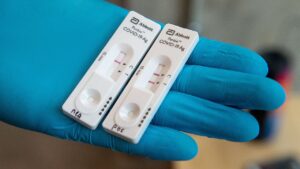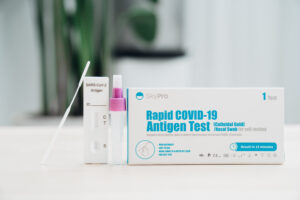
With the advent of COVID, individuals have begun to depend on rapid antigen tests. We’ll examine how fast antigen testing may benefit you in this post. At-home testing might be costly. Rapid antigen test for at-home use may cost as little as $20 for two tests or as much as $45 for one, depending on the brand, product, and retailer.
Often, at-home collection tests are more expensive. While many COVID-19 tests conducted by a health care practitioner are reimbursed by insurance, at-home testing is often not.
If the test results are positive: Self-isolate in accordance with CDC recommendations. Notify any immediate family members or friends who may have been exposed.
According to the CDC, an infected individual may begin transmitting COVID-19 about two days before developing symptoms or testing positive.
“By informing close contacts that they may have been exposed to COVID-19, you are assisting in the protection of everyone,” the agency states on its website.
For possible treatment and care instructions, contact your health care physician or local health agency. Health experts are concerned that millions of at-home fast antigen testing may be unreported, leaving public health authorities with an undercount of cases.
“As a physician, I’m concerned that some individuals may test positive at home and then avoid seeking health care,” McNally said. “However, it is preferable to test than not to test. These examinations may be really beneficial.”
McNally suggests retesting positive findings from rapid antigen tests with a PCR test conducted by a health care practitioner.
If the test is negative but you are sick, McNally recommends retesting with a health care professional.
Campbell emphasized that a polymerase chain reaction (PCR) or rapid antigen tests look for an active infection in the present moment, not for an illness in the future. Learn more about PCR by clicking here .
“Remember that a negative test conducted today is a negative test conducted today,” he said. “This is not a test that will be negative tomorrow or a week from now.”

Rapid antigen tests — or any other kind of COVID-19 testing — does not replace vaccination or other pandemic precautions. Health professionals emphasize that everyone should continue to get vaccinations if they are eligible, as well as wear a mask and maintain a social distance.
Campbell compared implementing various mitigation measures during a pandemic to a motorist adhering to all traffic safety regulations while driving.
“You respect driving regulations and keep your automobile in the best condition possible,” he said. “You are not driving while intoxicated, you are wearing your seat belt, and you have your children in a car seat.”
Drivers cannot just select one of the aforementioned and expect to be safe, he said. Similarly, people cannot remain safe just via testing, even if they are consistently screened for the virus.
“An at-home test will not prevent you from becoming ill,” Campbell said. “Perhaps the value is that you have a lower likelihood of passing it on to others. However, I would not replace a test for any of that.”
As schools, business buildings, and tourist locations reopen, leaders continue to seek direction on how to do so securely, for as long as feasible, and with the fewest potential transmission risks.
Rapid antigen tests may be beneficial.
NIC has been collaborating with our partners, Impact Health and Next Marketing, on TourHealth, a turnkey, quick COVID-19 testing solution.
Florida successfully partnered with your health, testing over 90,000 individuals in eight weeks — and sending the majority of findings within hours through an easy-to-use mobile app.
Additionally, the University of Mississippi in Oxford, as well as the state of South Carolina and the Alabama Department of Corrections, resorted to TourHealth to screen asymptomatic students, teachers, and staff.
As you make critical health choices about reducing COVID-19 limitations in your community, it may be beneficial to keep these five recommendations in mind to optimize COVID-19 testing and reopen with confidence.
Be familiar with the testing choices.
While some leaders are screening for typical COVID-19 signs via mass temperature checks and regular self-monitoring, others are adopting a more advanced approach with diagnostic testing for the virus. There are two widely used assays for COVID-19 diagnosis:
- Molecular (PCR) analysis: The PCR rapid antigen tests detect active infection by scanning a nose or mouth swab for the virus’s distinctive gene sequences. The samples are then transported to a laboratory, where they are analyzed and the findings are back within roughly 48 hours. These are the most frequently used tests.
- Rapid antigen tests determine the presence of an active infection by identifying particular proteins on the virus’s surface using a nose swab sample. Results are available in as little as 15 minutes. Along with the rapid turnaround time, a significant selling feature for these tests is their ability to be processed onsite at the point of service. Antigen testing are crucial in assisting leaders in real-time understanding of the COVID-19 situation. COVID-19 examinations are in great demand throughout communities, government buildings, college campuses, and nursing homes at the moment.
Innovative testing solutions are being created at a breakneck pace. Saliva testing, which was recently authorized by the FDA, is self-administered and provides findings within three hours. Certain organizations have recognized a need for rapid antigen tests options, and saliva testing would make at-home testing more feasible. Click here to learn more about rapid antigen tests cost and how you can get it.
“Choosing the right sort of test is not a one-size-fits-all decision,” said Dr. Benjamin Gerson, Medical Director at Impact Health. “Because our understanding of COVID-19 and testing is growing, we encourage leaders to do an ongoing study on testing choices and trends. For instance, a significant trend we are now seeing is advancements in saliva/oral fluid testing. Expect more availability in the following months. Additionally, anticipate a rise in interest in and availability of antibody testing.”
As Dr. Gerson said, rapid antigen tests are gaining popularity due to their capacity to identify previous coronavirus infections by assessing antibody levels to the virus in the blood. The tests are administered through finger stick or blood draw and results are often available the same day or within three days. Rapid antigen tests do not detect active coronavirus infection at the time of testing or determine whether a person is actively infected with COVID-19.
your health uses the rapid antigen tests to provide same-day results in Florida and Mississippi. 95% of those screened obtain their findings within two hours. Rapid response has been important in Florida, where coronavirus incidence surged throughout the summer owing to tourism. your health screened 80,000 individuals in only 45 days in Florida alone.


